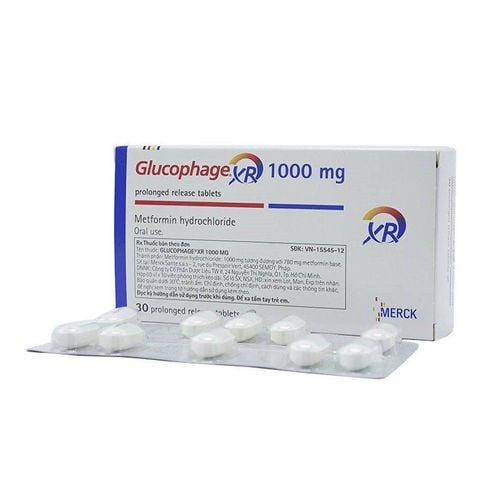1. What is Glucophage 750mg?
Glucophage 750mg is prescribed for the treatment of type 2 diabetes, particularly in overweight patients who have not achieved effective blood sugar control through exercise and dietary adjustments alone. The main active ingredient in Glucophage 750mg is Metformin Hydrochloride, and it is manufactured by Merck Santé S.A.S (France).
Patients with type 2 diabetes can use Glucophage 750mg either as monotherapy or in combination with other diabetes medications, such as Sulfonylureas and Insulin. The medication is formulated as extended-release tablets, packaged in boxes containing 2 blister packs of 15 tablets each. Each Glucophage tablet contains the following ingredients in specific amounts:
- Metformin Hydrochloride: 750mg
- Hypromellose (Hydroxypropyl Methylcellulose 2208), Sodium Carmellose (Sodium Carboxymethylcellulose), and Magnesium Stearate in sufficient quantities per tablet.
2. Indications and Uses of Glucophage 750mg
2.1. Indications for the Use of Glucophage 750 XR
Glucophage 750mg is typically indicated for the following cases:
- Use of the medication in combination with physical exercise and adherence to a proper diet to manage symptoms in patients with type 2 diabetes;
- Combination therapy with Insulin or Sulfonylurea to enhance the effectiveness of blood sugar control;
- Treatment for patients at high risk of developing complications associated with type 2 diabetes.
2.2. Uses of Glucophage 750mg
*Pharmacodynamics
The active ingredient Metformin in Glucophage 750mg is a biguanide that functions as an antihyperglycemic agent, lowering both fasting and postprandial plasma glucose levels. Metformin does not cause hypoglycemia in individuals without diabetes because it does not stimulate insulin secretion. According to research, the mechanism of action of Metformin typically involves three pathways:
- Inhibition of gluconeogenesis and breakdown of glycogen, thereby reducing hepatic glucose production;
- Increasing insulin sensitivity in muscles, improving peripheral glucose uptake and utilization;
- Slowing glucose absorption in the intestines.
Additionally, Metformin may act on glycogen synthase, thereby stimulating glycogen synthesis in cells. It also contributes to increased membrane glucose transporter (GLUT) activity.
Besides its role in managing diabetes, Metformin plays an essential part in lipid metabolism. Several clinical studies have shown that, at therapeutic doses, Metformin lowers total cholesterol, LDL cholesterol, and triglyceride levels.
Results from the UKPDS study demonstrated the long-term efficacy of Metformin immediate-release in obese patients with type 2 diabetes who were treated with Metformin following failed dietary intervention. Specifically:
- Reduced absolute risk of diabetes-related complications: 29.8 cases per 1000 patient-years in the Metformin group versus 43.3 cases per 1000 patient-years in the diet-only group;
- Reduced diabetes-related mortality: 7.5 cases per 1000 patient-years in the Metformin group versus 12.7 cases per 1000 patient-years in the diet-only group;
- Reduced all-cause mortality: 13.5 cases per 1000 patient-years in the Metformin group versus 20.6 cases per 1000 patient-years in the diet-only group;
- Reduced absolute risk of myocardial infarction complications: 11 cases per 1000 patient-years in the Metformin group versus 18 cases per 1000 patient-years in the diet-only group.
*Pharmacokinetics
After oral administration of a single dose of Glucophage 750mg, the peak plasma concentration of Metformin is typically reached within 5 hours, ranging from 4 to 12 hours, with an average concentration of 1193 ng/mL. Bioequivalence studies based on AUC and Cmax values in fasting and fed states have shown that Glucophage 750 XR is bioequivalent to Glucophage 500 XR at a 1500mg dose.
Similar to the immediate-release formulation, at steady-state, AUC and Cmax tend to increase non-linearly with the dose. After oral administration of extended-release Metformin 2000mg, the observed AUC was equivalent to that of immediate-release Metformin at 1000mg taken twice daily.
When Glucophage 750mg is taken on an empty stomach, AUC decreases by 30%, but Tmax and Cmax remain unaffected. Due to the extended-release formulation, the absorption rate of Metformin is minimally affected by food intake. Additionally, repeated doses of Metformin up to 2000mg did not result in drug accumulation.
Metformin binds minimally to plasma proteins and tends to distribute into red blood cells. The peak concentration of Metformin in blood is lower than in plasma and occurs at roughly the same time. The average volume of distribution of Metformin ranges from 63 to 276 L (Vd).
Metformin is excreted unchanged in the urine. The renal clearance of Metformin exceeds 400 mL/min, indicating that Metformin is eliminated through glomerular filtration and tubular secretion. After oral administration of Glucophage 750 XR, the apparent elimination half-life is approximately 6.5 hours.
For diabetic patients with impaired renal function, Metformin clearance decreases in proportion to the reduction in creatinine clearance. This may result in prolonged plasma half-life and elevated plasma concentrations of Metformin.
3. Dosage and Administration of Glucophage 750mg
3.1. Dosage of Glucophage 750mg
For adults with normal renal function:
- Monotherapy or combination therapy with other antidiabetic drugs: Glucophage 750mg is indicated as maintenance therapy for patients with type 2 diabetes who are currently taking Metformin in either immediate-release or extended-release form. The dosage of Glucophage 750mg can be equivalent to the patient’s daily Metformin dose, with a maximum of 1500mg taken after dinner. After 10 to 15 days of use, blood glucose levels should be measured to assess whether the Glucophage 750 XR dose is appropriate.
- Combination with insulin: For patients treated with a combination of Metformin and insulin for type 2 diabetes, the Glucophage 750mg dose may be equivalent to the daily Metformin dose, with a maximum of 1500mg taken at dinner. However, the insulin dosage may be adjusted based on blood glucose measurements.
For patients with type 2 diabetes and renal impairment:
- Before initiating Metformin treatment, renal function should be assessed. If the eGFR (estimated glomerular filtration rate) is between 60 – 89 mL/min/1.73 m², dose adjustment may be considered based on the degree of renal impairment.
- Patients with an eGFR between 30 – 59 mL/min/1.73 m² may use Metformin, except when there are factors that increase the risk of lactic acidosis. In such cases, the dosage can be adjusted as follows:
- Initial dose: 500mg once daily.
- Maximum dose: 1000mg once daily.
- Patients with an eGFR below 30 mL/min/1.73 m² should not use Metformin.
For elderly patients:
Elderly patients with type 2 diabetes have a higher risk of renal function decline, so the dosage of Glucophage 750mg may be adjusted by the doctor based on renal function assessments.
For children:
Glucophage 750mg is not recommended for children.
Note: Patients should start Glucophage 750mg at a low dose and gradually increase it to determine the minimum effective dose needed to control blood glucose and minimize gastrointestinal side effects.
3.2. How to Use Glucophage 750mg
Patients should take Glucophage according to the dosage prescribed by their doctor based on blood glucose test results. The medication should be swallowed with water, without chewing or crushing the tablet. It is recommended to take the tablet with or after dinner to reduce gastrointestinal discomfort.
For best results, patients being treated with Glucophage 750 XR should take the medication continuously every day, avoiding intermittent use or overdosing. Additionally, to enhance treatment efficacy and maintain better blood glucose control, diabetic patients are advised to combine the medication with a scientifically balanced diet. Patients who wish to discontinue treatment or experience any abnormal symptoms after using the medication should report to their doctor for appropriate guidance.
4. What to Do in Case of Overdose or Missed Dose of Glucophage 750mg
How to handle an overdose of Glucophage 750mg:
Although there are no signs of hypoglycemia when taking Metformin up to 85g, it may lead to lactic acidosis. This is a medical emergency, and the most effective method to eliminate Metformin and lactate from the body is hemodialysis.
How to handle a missed dose of Glucophage 750mg:
If a dose is missed, the patient should take it as soon as they remember. However, if the time until the next dose is too close, it is best to skip the missed dose and continue with the next dose as scheduled. Do not double the dose to make up for a missed dose, as this may result in an overdose.
5. Contraindications for the Use of Glucophage 750mg
Glucophage 750mg should not be used in the following cases:
- Patients who are allergic to Metformin or sensitive to any other active ingredients or excipients in the medication;
- Patients with acute metabolic acidosis;
- Patients in pre-coma due to diabetes;
- Patients with severe renal impairment, with a glomerular filtration rate (GFR) below 30 mL/min/1.73 m²;
- Acute conditions that may affect kidney function, including shock, severe infections, or dehydration;
- Patients at risk of hypoxia, especially those with acute diseases or complications of chronic diseases, such as respiratory failure, decompensated heart failure, shock, or myocardial infarction;
- Women who are breastfeeding;
- Patients with alcohol addiction, acute alcohol intoxication, or liver failure
6. Side Effects of Glucophage 750mg
During the treatment of type 2 diabetes with Glucophage 750 XR, patients may experience the following unintended side effects:
Common Side Effects:
- Rash or hives on the skin, increased skin sensitivity;
- Nausea, vomiting, diarrhea, loss of appetite, constipation, bloating, heartburn;
- Decreased levels of vitamin B12;
- Taste disorders.
Less Common Side Effects:
- Aplastic anemia, blood dysplasia, bone marrow failure, hemolytic anemia, agranulocytosis, thrombocytopenia;
- Lactic acidosis;
- Upper respiratory tract infections.
Patients should promptly inform their doctor or visit the nearest healthcare facility if they notice any of the above reactions in order to receive timely support.
7. Drug Interactions of Glucophage 750mg
Glucophage 750mg may interact with the following drugs or substances:
- Alcohol: Taking Glucophage 750mg with alcohol may increase the risk of lactic acidosis, especially in cases of liver failure, malnutrition, or fasting;
- Intravenous iodinated contrast agents: May increase the risk of kidney failure, leading to the accumulation of Metformin and lactic acidosis;
- Diuretics: When used with loop diuretics, Glucophage may increase the risk of kidney failure and lactic acidosis;
- Angiotensin-converting enzyme (ACE) inhibitors: Can lead to excessive lowering of blood sugar;
- Drugs with intrinsic hyperglycemic activity and sympathomimetic substances: These can reduce the hypoglycemic effect of Metformin.
To avoid any unfavorable interactions affecting the therapeutic effects of Glucophage 750mg, patients should inform their doctor of all the medications they are currently taking.
8. Precautions and Storage of Glucophage 750mg
Pregnant women and breastfeeding mothers should not use Glucophage as it may affect the pregnancy and the health of the newborn. For individuals whose work requires high concentration, such as driving or operating machinery, caution should be exercised when using this medication, as it may cause excessive hypoglycemia.
The medication should be stored in a dry, cool place with appropriate humidity. Avoid storing the medication in areas with high humidity or temperatures exceeding 30°C. It should also be kept away from direct sunlight.
Before using the medication, check the expiration date and the information on the product packaging. If you notice signs of mold, deformation, or leakage, do not use the medication and dispose of it immediately.
To arrange an appointment, please call HOTLINE or make your reservation directly HERE. You may also download the MyVinmec app to schedule appointments faster and manage your reservations more conveniently.
To arrange an appointment, please call HOTLINE or make your reservation directly HERE. You may also download the MyVinmec app to schedule appointments faster and manage your reservations more conveniently.








